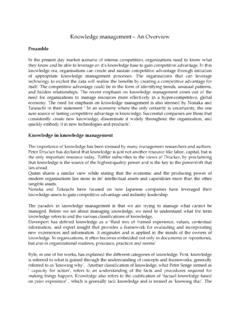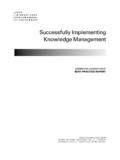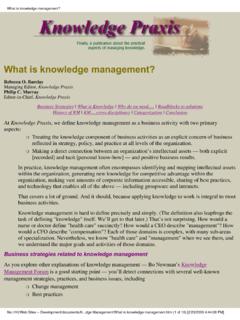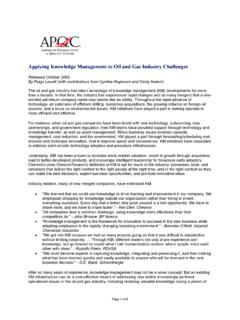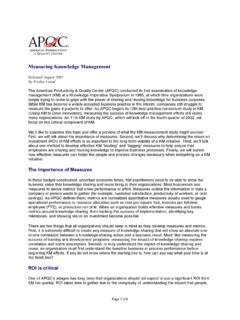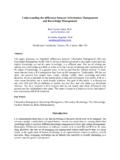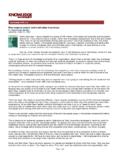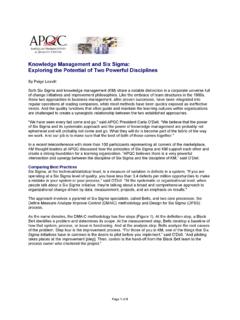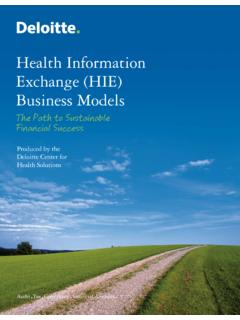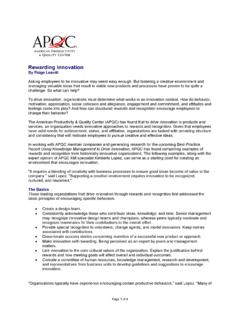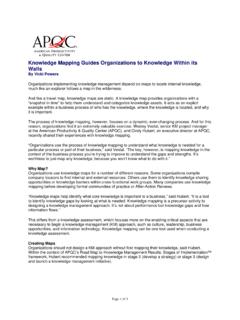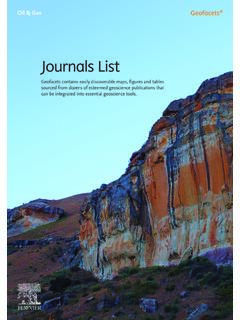Transcription of 12 Principles of Knowledge Management - Provider's Edge
1 12 principles of knowledge management By Verna Allee Understanding Knowledge is the first step to managing it effectively. Here are a dozen characteristics of Knowledge , and some tools and approaches for making the most of the Knowledge assets in your organization . Winston Churchill said, "The empires of the future are the empires of the mind." Tom Peters said, "Heavy lifting is out; brains are in." Stately or slangy, it's a fact that Knowledge is edging out buildings and gear as the essential business asset. Even advertising and marketing use such words as Knowledge , intelligence, and ideas. When many companies must innovate or die, their ability to learn, adapt, and change becomes a core competency for survival. Most seek more Knowledge through training, education, and career development. Every business is a Knowledge business; every worker is a Knowledge worker. The Knowledge economy has brought new power to workers.
2 Many are "free agents," contingency workers that make up almost a third of the workforce. Workers own the means of production-their Knowledge . They can sell it, trade it, or give it away and still own it. As a result, the ways we manage people have undergone a dramatic, fundamental shift. Knowledge is perishable. The shelf life of expertise is limited because new technologies, products, and services continually pour into the marketplace. No one can hoard Knowledge . People and companies must constantly renew, replenish, expand, and create more Knowledge . That requires a radical overhaul of the old Knowledge equation: Knowledge = power, so hoard it. The new Knowledge equation is Knowledge = power, so share it and it will multiply. Widespread noncompetitive benchmarking and best-practice sharing show how eagerly we are embracing the concept of Knowledge sharing. Hubert St. Onge, who led the development of the Knowledge Management approach at Canadian Imperial Bank of Commerce, sees the primary challenge as making an organization 's unarticulated or tacit Knowledge explicit so that it can be shared and renewed constantly.
3 "It is important," he says, "to understand how Knowledge is formed, and how people and organizations learn to use it wisely." 12 guiding Principles A navigation technique is to look at the stars to tell you where you are. Similarly, we must use a powerful new " Knowledge lens" in order to navigate or manage our companies. But we can't manage Knowledge in a traditional way. Always changing, Knowledge is more organic than mechanical. Nevertheless, here are 12 fairly steady Principles about Knowledge . 1. Knowledge is messy. Because Knowledge is connected to everything else, you can't isolate the Knowledge aspect of anything neatly. In the Knowledge universe, you can't pay attention to just one factor. 2. Knowledge is self-organizing. The self that Knowledge organizes around is organizational or group identity and purpose. 3. Knowledge seeks community. Knowledge wants to happen, just as life wants to happen.
4 Both want to happen as community. Nothing illustrates this principle more than the Internet. Page 1 of 6 4. Knowledge travels via language. Without a language to describe our experience, we can't communicate what we know. Expanding organizational Knowledge means that we must develop the languages we use to describe our work experience. 5. The more you try to pin Knowledge down, the more it slips away. It's tempting to try to tie up Knowledge as codified Knowledge -documents, patents, libraries, databases, and so forth. But too much rigidity and formality regarding Knowledge lead to the stultification of creativity. 6. Looser is probably better. Highly adaptable systems look sloppy. The survival rate of diverse, decentralized systems is higher. That means we can waste resources and energy trying to control Knowledge too tightly. 7. There is no one solution. Knowledge is always changing. For the moment, the best approach to managing it is one that keeps things moving along while keeping options open.
5 8. Knowledge doesn't grow forever. Eventually, some Knowledge is lost or dies, just as things in nature. Unlearning and letting go of old ways of thinking, even retiring whole blocks of Knowledge , contribute to the vitality and evolution of Knowledge . 9. No one is in charge. Knowledge is a social process. That means no one person can take responsibility for collective Knowledge . 10. You can't impose rules and systems. If Knowledge is truly self-organizing, the most important way to advance it is to remove the barriers to self- organization . In a supportive environment, Knowledge will take care of itself. 11. There is no silver bullet. There is no single leverage point or best practice to advance Knowledge . It must be supported at multiple levels and in a variety of ways. 12. How you define Knowledge determines how you manage it. The " Knowledge question" can present itself many ways. For example, concern about the ownership of Knowledge leads to acquiring codified Knowledge that is protected by copyrights and patents.
6 A concern about Knowledge sharing emphasizes communication flow and documentation. A focus on Knowledge competencies leads to seeking more effective ways to create, adapt, and apply Knowledge . At sea Managing Knowledge requires the appropriate tools. Here are some navigational aids. A north star. A north star represents the purpose, sense of identity, and core Principles that guide an organization . Knowledge self-organizes around organizational purpose. Without a north star for Knowledge , it's impossible to focus on what is needed. The driving values for creating and sharing Knowledge may differ. At Buckman Laboratories, for example, the driving value is Knowledge of customers. With the implementation of the K'Netix Knowledge sharing network, Buckman began treating Knowledge as its most strategic asset. CEO Robert Buckman takes Knowledge leadership seriously. He says, "For Knowledge sharing to become a reality, you have to create a climate of trust in your organization .
7 " At Canadian Imperial Bank of Commerce, the emphasis is on building Knowledge capital. At Chevron, CEO Ken Derr emphasizes commitment to learning through sharing best practices for continuous improvement. But the common element at the core of those different approaches is Knowledge . Companies that are serious about Knowledge often create formal Knowledge - Management functions. A Knowledge leader sets the course and attends to the Knowledge creation process. For example, a job title at Philip Morris is Knowledge champion. Monsanto has a director of Knowledge Management . Dow Chemical has a director of intellectual asset Management . In other companies, human resource executives may become Knowledge managers or directors of organizational learning. Companies such as Owens Corning create centers of excellence to facilitate Knowledge creation and sharing. A compass. An organizational compass consists of guiding Principles and strategy.
8 Best-practice companies in Knowledge provide a way to expand Knowledge by taking an integrated, multimodal systems approach. Page 2 of 6 Successful strategies for the Knowledge era ensure that people can create and expand common languages around their work. Examples include the implementation of total quality Management at Motorola and General Motors. By providing new process-analysis and problem-solving tools, TQM expands organizational intelligence. Texas Instruments and Chevron are noted for sharing best practices, both internally and with benchmarking partners. TI also spreads Knowledge through "sharing sessions" and by transferring employees to other parts of the company. The crew. Knowledge is embodied in people. It's impossible to talk about Knowledge without addressing the way people work together, learn together, and grow in Knowledge individually and collectively. Companies that are serious about Knowledge foster an environment and culture that support continuous learning.
9 Owens Corning has envisioned a future that requires a strategic focus for Knowledge . Its new corporate headquarters represents that vision. In fact, Knowledge sharing is a critical element of the new building's design, which has the latest communication technologies and a multipurpose Discovery Center geared to self-improvement and business Knowledge . Employees know they will be expected to become more self-directed in their learning. A culture of Knowledge can be encouraged in many ways. For example, in order to recruit top talent, Genentech lets its scientists publish their findings immediately in leading journals. In the past, the usual two-year delay made it impossible for the scientists to be first in their field, which is important for career recognition. Since the new policy, Genentech now ranks fourth among research institutions in molecular biology and genetics. Successful Knowledge sharing also requires being linked to a company's reward system, such as Federal Express's pay-for- Knowledge program.
10 At Ernst & Young, part of each consultant's compensation is based on Knowledge sharing activities. At Lotus Development, 25 percent of a customer-support worker's performance evaluation is based on Knowledge sharing. Maps and guides. Knowledge -based organizations seek guides, maps, and pathways for building Knowledge across multiple performance levels. They understand the processes that support the creation, acquisition, sharing, and renewal of Knowledge . Companies that value Knowledge want to know how and where to access it. Many companies, such as Chevron and Hughes Space & Communication, are undertaking Knowledge mapping-guides to in-house experts. Other firms, such as McKinsey & Company, use Lotus Notes or databases to create Knowledge sharing forums. Common interest groups, called communities of practice by researchers Susan Stucky and Peter Henshel, demonstrate a shift from authority of position to authority of Knowledge , according to Charles Savage in Fifth Generation Management .
